What You Missed by Having a Life on Sunday Mornings

What you missed on the Sunday morning chat shows:
[Former White House Deputy Press Secretary Bill] Burton swings around and tells Rove that Cantor and Boehner and McConnell don’t want to help the economy, they just want to score political points. Rove says, “Bill, don’t question the motivations of the people on the other side of the aisle.” Karl Rove holds several copyrights and trademarks on “questioning the motivations of the people on the other side of the aisle” and he guards them zealously.
And that’s the highlight of the intelligent discourse. (There’s also an extended segment on Romneycare v. Obamacare and O’Romneycare. Hoo boy.) How are these even things that happen on the TV??? Welcome to the ghastliest election cycle ever.
DSK Case File Said to be Dropped Behind Radiator, Ignored

We’ll learn more this morning but apparently the case against Dominique Strauss-Kahn is to be dropped. According to the New York Post, this is because his accuser has had… “questionable personal relationships”? (Uh, me too?) And was a “liar.” According to the Times, “One law enforcement official involved in the investigation said no single problematic detail about Ms. Diallo’s background, or even all of them put together, had undermined the prosecution’s faith in its ability to present a viable case” — but that the department felt they couldn’t put her forward as a viable witness. If the motion the DA’s office files today resembles this patchwork of weird character/witness issues — and it should contain something more substantial than all this — then I’m not really sure what the point in having a DA is? What a mess: this freakshow was mismanaged by all parties, except apparently the people whose full-time job it was to leak things to the press. Those people should get a raise!
The End of Gaddafi

In case you were in a blackout all weekend, it’s say to say that Gaddafi’s regime officially toppled over the weekend… probably. (No one’s quite ready to say it.) The pictures and video are amazing! Still everyone (everyone being “all the people who are not skirmishing in the streets of Tripoli”) keeps hedging, because no one’s been sure all night where Gaddafi himself is. (I know where he is: in an extremely long and entirely gold-lined emergency escape tunnel. The other end is surely either in Malta or Crete.)
My favorite update from the awesome Al-Jazeera? “Police have surrounded the Libyan embassy in Sarajevo, Bosnia, after a number of people entered the building and threw pictures of Muammar Gaddafi out the window.” You know stuff is bad when the Bosnians are harshing on you. Another favorite update is that the “National Transitional Council,” which is a terrible name for the “rebel governing body,” announced a free Libya via mass text. What a time we live in! In any event, Gaddafi’s sons are in jail and this is an incredible day and there’s a party all over the world and you should be glued to the TV, unless you’re busy routing armed Gaddafi loyalists.
The Last Weekends of Summer in New York City Are the Greatest

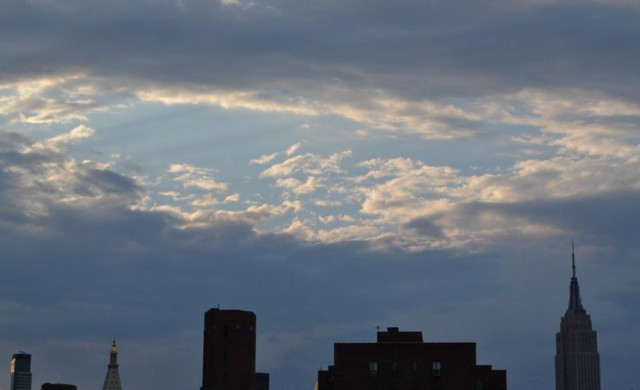
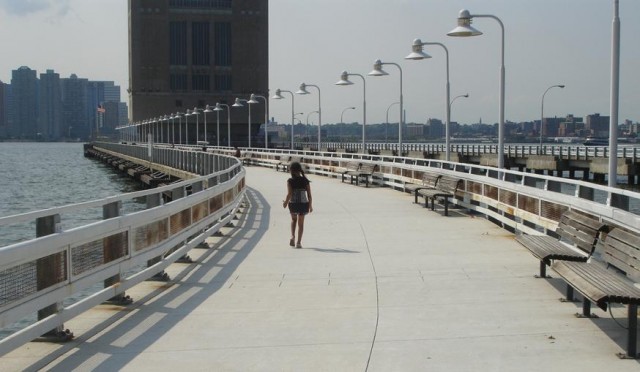
Or you can stay indoors and read what everyone else is reading: Two Years at the Tea Party ● Will Ebooks Keep Writers From Writing? No ● Authors Who Got Their Start As Copywriters ● ‘Fright Night’ Remake: Totally Awesome! ● 52 Funny Things About the Death of the ‘New York Press’ ● What Makes a Great Critic?
Photos by Steven Guzzardi, swiper bootz and Eden pictures.
Tomorrow's the Last Day of "Summer Streets" Weirdness

Tomorrow is the last day of Summer Streets programming, running down Manhattan at various locations with like, yoga and snacks and stuff. It’s a very weird public-private endeavor, but I’m into it! Anything to make the City a little more unexpected. Plus: free bike repair in Soho! And sandcastles.
Fun Facts About Steve Jobs
“He’s the anchor baby of an activist Arab muslim who came to the U.S. on a student visa and had a child out of wedlock. He’s a non-Christian, arugula-eating, drug-using follower of unabashedly old-fashioned liberal teachings from the hippies and folk music stars of the 60s.”
— This description of Steve Jobs even omits “college dropout”!
Martha's Vineyard: Trailer Trash Since 1642
“1921 Upon learning that President Calvin Coolidge had been out of Washington on vacation in Marion, Ohio, for a week, Dorothy Parker’s less clever sister is reported to have remarked, ‘How could they tell?’”
— Since everyone is FREAKING OUT about Barack Obama going to Martha’s Vineyard on vacation, here is a brief history of Presidential vacations. The best is that everyone’s all upset about how ELITIST his vacation choices are. The dude grew up in HAWAII. And also, it’s not like he owns a 1500-acre ranch in Texas? Also am I going to be the one to point out that Martha’s Vineyard, much like Cape Cod, is pretty much populated by white trash who’ve just been here a few hundred years longer than most of the rest of us? (Oh apparently I am.) I mean, these people were whalers! And angry white people! They almost seceded from Massachusetts!
52 Funny Things About the Death of the 'New York Press'
by Anonymous Former Employees of the New York Press
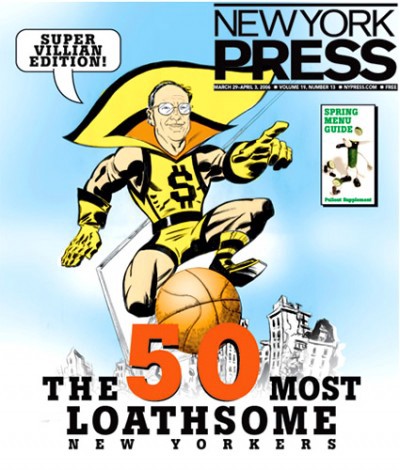
Back in the heady days of 2005, before Great Recessions and the Really Great Implosion of Print Media were well under way, New York Press writer Matt Taibbi published a piece titled “The 52 Funniest Things About the Upcoming Death of the Pope.” It prompted then-Congressman Anthony Weiner to tell people to throw out the paper. It probably got the scrappy alternative newsweekly more national press than it ever expected — but it also certainly began the steady descent in advertising dollars that is the lifeblood for a free weekly.
Six years later, Weiner is disgraced and Taibbi is writing books about Wall Street misdeeds while holding down a gig at Rolling Stone. Things sure do change! And this week it was made official: The paper-that-would-not-quite-die has been taken off of life support and will go into some sort of coma. Here’s how a group of former editors of and contributors to the often-hated rag will remember the little newspaper-of-ill-repute-that-could.
52. New York Press editors will have no outlet in which to run sex stories written under pseudonyms.
51. Ninety percent of Bushwick bands will have no forum to say a bunch of stupid shit and then get salty about it after publication.
50. Todd P gets 83% fewer Google Alerts about himself.
49. Luscious summer interns face reality of not being made aware of their desirability.
48. Sam Sifton now finally freed from pesky non-compete clause, can achieve his dream job.
47. Armond White no longer has a J. Hoberman-bashing platform (except the wooden one he built that time in shop class).
46. Future Park Slope dads will have nowhere to work during their glory days to remind Brooklyn children of how cool they used to be.
45. Adario Strange who?
44. Less street boxes = less places to find material for my new blog, “Cups of Pee.”
43. To think, Russ Smith wanted to buy the Village Voice before New Times snapped it up. Moved to Baltimore and started a website instead.
42. To think Anthony Bourdain’s first piece got bumped and went to the New Yorker. And the rest is history.
41. Wait, the New York Press didn’t die years ago?
40. Where else will I go to find a massage from a Thai lady-boy?
39. The Village Voice is left as the sole free packing material for moving (and place to find Thai lady-boys).
38. Bums will have thousands of completely empty green boxes to store their blankets without complaint.
37. The innovative “stuff everything on one page with some stock art” design aesthetic may never recover.
36. The Mohammed comics can now be published by Our Town Downtown.
35. No more underpaid jobs for up-and-coming writers and editors who really just want to see bands for free.
34. Fionna Apple now best source of Jonathan-Ames-has-embarrassing-sex stories.
33. Transvestites can no longer be credible news sources for stories on LES haunts that closed down 32 years ago.
32. Recovering drug addicts must look farther than newspaper bedsheets to find outlet for unedited ramblings.
31. Publicists emailing pitches to New York Post have exponentially better chance of actually reaching it.
30. Nostalgic writing about when New York City was a great, cool, better place to live finally takes a dip.
29. Your newsclipping about the best pierogis in Greenpoint will mean a lot less to people.
28. Your award of Best Bathroom to Have Sex in matters a whole lot less.
27. Gerry Visco now most notable for being oldest living Confederate widow — and nothing more.
26. Mugger now only remembered as the person who wants your wallet.
25. LES burrito shops less likely to be seriously reviewed in 800-word pieces.
24. Without obsessive old-club-kids nightlife coverage, Susanne Bartsch turns into bat and flies out of New York City forever.
23. Transexual phone-sex advertising sales takes a serious look at itself in the mirror (blinks, wipes nose and looks closer).
22. Freelance writers citywide resort to can collecting in order to fund Pabst and weed habits.
21. Socially awkward writers of the city make last ditch effort to save paper, get distracted, complain about not getting paid on time, sleep with one another, start blogging for HuffPo.
20. Matt Harvey has nowhere but Tumblr to wax eloquent about his former heroin days.
19. Does this mean that Capital New York actually could work? Or the opposite?
18. Amy Sohn can now forget that embarrassing time in her life she wrote about. No, the earlier one.
17. Literally no place exists to write about punk or hardcore or other bands people loved when they were teenagers. Except Tumblr.
16. Blogs win!
15. Hundreds of New Yorkers will discover that Craigslist offers “massage artists” as well.
14. Last person who has stories about Harry Siegel’s office desktop (and futon) encounters turns to dust.
13. Profanity and ass content of Manhattan Media publications reduced by 99.9 percent.
12. Susan Shapiro has to launch her own publication, titled “Sue’s News,” to publish all of her students’ first person humiliation essays.
11. One less publication title for minor journalist empires to trade amongst themselves to feel a little bit cooler and relevant for a brief period.
10. The quality of BrooklynVegan will improve from non-existent to pretty bad.
9. The trademark for the publication’s slightly-tilted P will return to its original holder: Master P.
8. The L Magazine is still publishing.
7. John Strausbaugh can stop telling everyone: “I told you so.”
6. Legions of Toy Story fans feel overwhelming sense of vindication. But I Hate Armond White fan clubs are left dispirited and leaderless.
5. Russ Smith no longer keeps movers on retainer, ready to swoop in to save the day for libertarians everywhere.
4. The circulation for New York Press will actually stay about the same, as will the page count.
3. No one has to reach as far: The media circle jerk just got that much smaller.
2. This should free up some of Tom Allon’s time to really take a serious stab at this mayor thing.
1. Answer to douchey question “New York Press, is that still around?” is now a simple: “No.”
This semi-fond reflection was organized by Jerry Portwood.
'Fright Night' Has No Business Being This Good
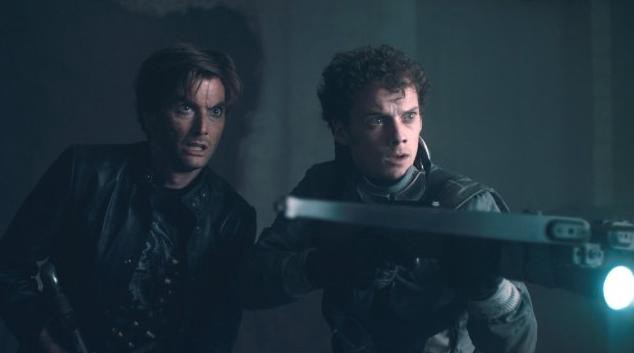
Some horror movies want to turn your stomach into fermented battery acid. Some want to slap you with political/gender/socio-cultural statements. And some are just there to bring the awesome (and shower you with ironic gore). Which brings us to Fright Night, opening today.
The 1985 original was one of those tepid ’80s movies that make us olds feel all nostalgic but, at the end of the day, was truly crap. The premise was your classic “fear thy suburban neighbor” scenario: teenage kid lives with single mom in Anywhere, USA and discovers the cool single guy next door is a vampire. Clichés and lame special effects abound, and characters flounder in pools of phlegmatic dialogue. The only life in this movie was Chris Sarandon (of Prince Humperdinck fame) as the vampire, though with his oily biceps and Rizzo hair, he looked like he’d sprung straight from the bowels of a Richard Simmons video.
But the remake… Well, it’s simply great. Better than a mid-August ‘80s-remake vampire flick has any right to be.
Director Craig Gillespie knows exactly what he’s here to do: make a smart, mainstream carnage-fest that manages some originality without going all Yōkai torture porn. Give us a dose of savvy dialogue between your standard relatable teens (loveable hero Charley Brewster, played by Anton Yelchin, has a falling out with his former best friend, Christopher Mintz-Plasse, over their LARPing past). Shovel on some gore and monster effects, and then let the characters cut loose. Marti Noxon’s clever script lulls you into “Yeah, yeah, I know where this is going” complacency for the first 20 minutes or so and then tosses in a fantastic loop that takes us fully out of ’80s dullness. The element that makes the plot-craziness work is the setting: Vegas, that sanctum of transience where nothing wholesome or normal ever happens to anyone.
And then there’s the cast. Girls have been getting their fair share of attention in horror lately, but this one’s all about the boys (hey, we can afford to be generous). Thankfully, the two female leads get significant intelligence upgrades from the original; the mom (a tan and sexy Toni Collette) and cutie girlfriend Amy (Imogen Poots) can handle themselves in a crisis and don’t subject us to any of the flailing idiocy of their ’80s counterparts (though Amanda Bearse will always be awesome).
But Fright Night belongs to the dudes. The audience cheered when Mintz-Plasse, aka McLovin, hit the screen (poor kid — but this is the typecasting hand you’ve been dealt, so you may as well run with it). David Tennant is slap-somebody good as “vampire slayer” Peter Vincent, a Midori-guzzling pleather-wearing faux-Russell-Brand-doing-Criss-Angel that’s funnier than, well, Russell Brand. Sarandon shows up for a fun cameo (which almost no one in the theater registered, since they were still encased in amniotic fluid when the original was released). And there’s even a Franco! (Dave Franco, James’s brother, playing the manscaped cool-kid.)
And of course, there’s Colin Farrell, loping across the screen in wife beaters and circulation-cutting jeans, desecrating everyone with his unholy, unpasteurized sexual energy. He’s the perfect monster — who isn’t a little afraid of Colin Farrell? His slightly manic puppydog eyes, his absurd good looks, his sudden, uncomfortable vulnerability, the rumors of his massive, er, shoe size. He’s all id and ego: a walking erect cock. Gillespie plays up the “fear of the predatory bachelor” perfectly with Farrell’s dirt-caked appearance and sparsely furnished house (the only piece of serious furniture is a 50” flatscreen). Farrell knows when to play it “cliché vampire” and when to go off the grid, and he even does humor: The scariest scene in the movie is made hilarious by his watching “Real Housewives of New Jersey.”
Who wouldn’t want to see the blue-eyed, marble-chiseled Yelchin take on this manimal? The contrast between the two — the emotionally vulnerable and slightly weak kid, versus the all-power, all-destruction pillar of virility — is played to maximum effect in one exchange. The scene is blood-free, but by far the creepiest in the film. In it, Jerry the Vampire informs Charley that the women in his life are “ripe for plucking,” and there are a “lot of bad people in the world” who’d be happy to do it. After that throwdown, well, it’s on, and you can’t help but be psyched when Charley metamorphoses from sullen jellyfish to self-sacrificing badass. (OK, maybe you can help it. Now stop looking at Colin Farrell’s ass.)
As for the whole 3D business, when I asked the publicist why 3D was necessary in a vampire flick, she gave me an incredulous look and said, “Why would you watch something in 2D when you can watch it in 3D!?” To which I replied, “Why would you watch something in 3D when you could stab yourself in the cheek with a ballpoint?” (All right, I didn’t really say that. Her attitude exemplifies the current industry sentiment, and I pick my battles.) Still, this 3D doesn’t have the schlocky awfulness of, say, Final Destination 4 and 5. It’s used with discretion and it even heightens some of the best gory moments, like when a Vegas showgirl explodes into a cloud of blood or a motorcycle comes crashing through a van window… you get the drift.
Oh, and there’s merciless mockery of Twilight, too. Win!
So yes, ‘Fright Night’ gets 4 bloody chainsaws (out of five). If you don’t like it then you hate fun.




Melissa Lafsky, The Awl’s Horror Chick, wants to be scared by your movie.
Mr. Swift's Moronic Proposal: Ebooks Will Keep Writers From Writing!
by Paul Carr
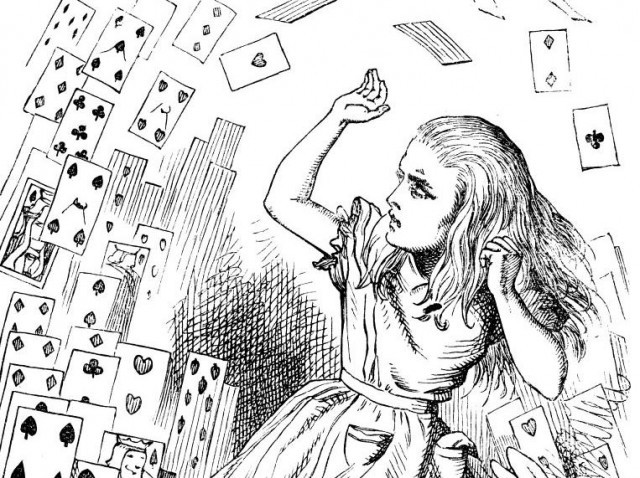
It’s a generally accepted rule that you shouldn’t take too seriously anything an author says while promoting his book on the radio. Or at least I thought it was a generally accepted rule. Certainly, Christopher Buckley tells a great anecdote about the time he was asked by a radio host whether, per the author bio on his novel Little Green Men, he really had acted as policy advisor to William Howard Taft. Not only did Buckley happily confirm that he had advised President Taft, but he spent the remainder of the interview discussing the specific advice he’d imparted to the (very) late statesman. Of course Buckley said something ridiculous on the radio — he had a book to promote.
And so it was that Booker Prize-winning author Graham Swift appeared on the BBC’s World At One program this past Wednesday to promote his new book, Wish You Were Here. Asked for his views on the rise of ebooks, he said this:
“I think the tendency will be that writers will get even less than they get now for their work and sadly that could mean that some potential writers will see that they can’t make a living, they will give up and the world would be poorer for the books they might have written, so in that way it is quite a serious prospect.”
Or put in simpler terms, Swift suggested that would-be novelists are likely to look at the low royalties paid on ebooks and think “screw this writing lark, I’m going to become a plumber.”
Such a patently ludicrous statement should have led to a collective rolling of eyes. “Oh that Graham Swift,” we all ought to have said, “he’ll say anything to sell a book.” Incredibly though — perhaps because Swift won the Booker, or maybe because the publishing industry is so frightened of technology that they’ll repeat any old scare story, and perhaps at least in part because the Internet will repeat any claim at all — Swift’s words made (SEO-friendly) headlines around the world. From the Telegraph and the Daily Mail to the Hindustan Times and the Huffington Post, all repeated his opinion as terrifying fact. “Digital rates could dissuade authors from writing.”
Now, of course, Mr. Swift’s standing in the literary world gives me pause before I call him a fucking idiot. Furthermore, his status demands that I take a deep breath before suggesting that he is a clueless old fool, babbling about technology he doesn’t understand to a BBC journalist too awestruck to challenge him. And it certainly requires that I at least count to three before breaking down all of the ways that, from start to finish, Swift’s interview was a towering tidal wave of horseshit.
One, two — okay.
Swift’s first assertion — that low royalties mean would-be authors might choose not to write — is idiocy, pure and simple. Ask a roomful of successful authors why they decided to write and not one of them will answer “for the money,” any more than a hooker would say she chose her profession “for the flowers and candy.”
Even for those of us lucky enough to have won a book deal, being an author is a pretty ghastly way to earn a crust. If being paid was our primary motivation, we’d have been far better off working in advertising or PR or posing as African princes to con idiots out of their savings. The reality is, those of us who write books for a living do so because we choose to: either because we have some burning desire to tell a story, or because we’ve tried real jobs and found ourselves lacking. We’d write for free (and frequently have done so) — but winning a book deal means we get to sleep till noon and spend our afternoons dicking around on YouTube when we should be typing. Moreover, the notion that authors have to choose between writing and a proper job has no basis in reality. Trollope, Kafka, Faulkner, Heller, Bukowski, Eliot, Grisham, King, Fleming, Chaucer… the list of authors who
held down day jobs while working on their masterpieces is likely longer than those who didn’t. You can add Graham Swift to that list too: his first novel, The Sweet-Shop Owner, was written in short 5 a.m. bursts before the author headed to his teaching job.
But still Swift drones on about the evil of ebooks, his argument growing wider — and weirder — as the interview progresses. It turns out, digital publishing is going to starve all authors, not just newbies:
When anything goes digital, let alone something as immaterial as a book, there is a tendency to see it as just in the air to be taken, and to lose the sense that somebody once made it… I think the purveyors of e-books are only too happy for this atmosphere of ‘everything belongs to everybody’ to increase because it means they don’t have to think so much about the original maker of the thing, or they can get away with paying them less.
Nurse, the screens! If I understand Swift correctly — and, depressingly, I do — he’s suggesting that the purveyors of ebooks want people to believe that books are free, so they can get away with paying smaller royalties to authors. It’s unclear who Swift means by “the purveyors of ebooks.” Perhaps he’s talking about Amazon or Apple — companies whose ereaders contain more anti-piracy measures than a Somali oil tanker, making it near-impossible for readers to re-sell, loan or even quote text from their legally purchased ebooks.
No, you’re right, he can’t mean them. It must be the publishers, then, who want us to see books as “just in the air to be taken.” Except that everything the publishing industry has done so far — from forcing Amazon to charge inflated prices for ebooks to trying to block Google Books from indexing their authors’ text — suggests they value ebooks very highly indeed; perhaps a little too highly. (I can’t speak for Swift’s publisher, but my own contract with Weidenfeld & Nicolson — part of Hachette — offers perfectly agreeable terms for ebooks; and I haven’t even won the Booker.)
Next up, Swift takes aim at those who suggest impoverished authors should find other ways to profit from their work: “You can’t perform a book — so if writers go and give readings, or whatever, that’s not as it were the equivalent of their book. It’s that wonderful reading experience… that matters.”
Anyone who has read Last Orders, the novel which won Swift his Booker, will know what he’s talking about. It’s a truly beautiful piece of writing, and one that can only really be appreciated in its original, printed form. How heartbreaking it must have been, then, for Swift to find himself forced to allow Last Orders to be adapted into a critically acclaimed movie starring Michael Caine and Bob Hoskins. And how he must have wept when he read the New York Times review of the film….
For Mr. Schepisi, who wrote and directed the film version of ‘’Last Orders,’’ the principal challenge must have been how to translate the specific gravity of Mr. Swift’s prose, with its multiple narrators and its stripped-down cockney lyricism, into the light and shadow of cinema…. Mr. Schepisi… has succeeded beyond all expectation.
One can only hope the big fat check Swift will have received from the movie company went some way towards fucking his pain away.
And so finally Swift’s horseshit tsunami reaches its greatest height with the tale of Charles Dodgson (aka Lewis Carroll) who, Swift tells us, turned the publisher-author relationship on its head by convincing Macmillan to publish Alice In Wonderland (“and pay for that process”), with Dodgson keeping a literally incredible 90% of the proceeds.
“In my view, that is the correct arrangement,” Swift tells the BBC, “but of course it would be sheer wonderland now to go to a publisher and say: ‘I can give you a royalty.’”
Yeah! Except that’s exactly not what happened. Alice In Wonderland was published by Macmillan, and the publisher did take a very small percentage of the proceeds, with Dodgson pocketing the rest. But that’s because Alice, like many books in the 1800s, was published “on commission.” Today we’d call it vanity publishing: Dodgson’s deal with Macmillan required that the author pay all of the costs of printing and producing Alice, with the publisher acting as a distributor. If the book did well (as it did, in Dodgson’s case), Macmillan only received its 10% commission — but if it failed to break even (as most books did then, and still do today) the author was in the hole for all of the costs.
Frankly, I’d rather stick with my greedy old regular publisher for my next book than risk financial ruin going it alone, but if that’s really the deal that Swift wants, he’s in luck: today, any budding Charles Dodgson need only upload his work to the Kindle or iBooks stores and up to 70% of the cover price will be his to keep — accessing an enormous consumer base with one-click purchasing enabled, all without a single penny due in printing costs. (This is, after all, how Ars Technica just made $15,000 in 24 hours, with their 27,300-word assessment of the new Mac operating system, and how Jon Krakauer moved 20,000 copies in a few days of his latest essay.) A wonderland indeed! You fucking idiot.
Paul Carr is the author of The Upgrade: A Cautionary Tale of a Life Without Reservations and Bringing Nothing To The Party: True Confessions Of A New Media Whore.
